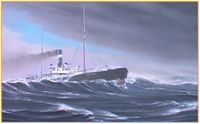Time has a different meaning for the lone sailor. Without the bustle of the other and his busy business, the clock can become another ornament on the desk, rather than ones keeper. When one has been days alone, what are hours? And when one has been months alone, what are days?
Isn't it strange how the texture of time and our temporal reality is influenced by our state of mind. A tedious, boring task can take 'forever' - whereas, 'time flies when you're having fun.' In reality, of course, in hard physical reality (i.e. the earth's passage around the sun) neither of the foregoing statements are correct. However, from the subjective point of our personal reality, both statements are abundantly true. After all, life for each of us will only ever be as it seems to us.
Many philosophers suppose that time is a strictly physical property, having no meaning for the spirit - many psychoanalysts believe that this is true of the unconscious as well. So, might the differences in our perceived relationship with time be a function of our spiritual selves as much as our cognitive selves? Of course many cognitive psychologists will talk about perception of time as a combination of 'state' and 'thought operations.' But let's not go there - I have long since grown bored with arguing the toss with our cognitive behavioural brethren. And besides, they seem to do quite a good job of this among themselves.
I have always been drawn to the zen notion that time does not actually exist - just the present moment. And, of course, the experience of zen practice for each person is an entirely subjective thing, but many have mentioned to me their profound sense that the moment is not just one of many moments - rather, it is a thing by itself, moving with them, sort of. I too have experienced this sense, and it is difficult to place into language. However, if my sense of the moment is anywhere near correct, that would mean that time does not truly exist. And the zen notion of being in the moment is a matter of present awareness (as they often call it) rather than focusing ones attention on a specific point along a continuum (of moments).
I do not claim to be a zen teacher or anything of the sort, just a traveler on the seas, like many others. But, for me, and for each one of us, it seems a pity not to strive for a state of present awareness -- the moment, the now, is all we can ever have. It is our only true possession.
And in it we may find the wisdom to answer all of our questions.



